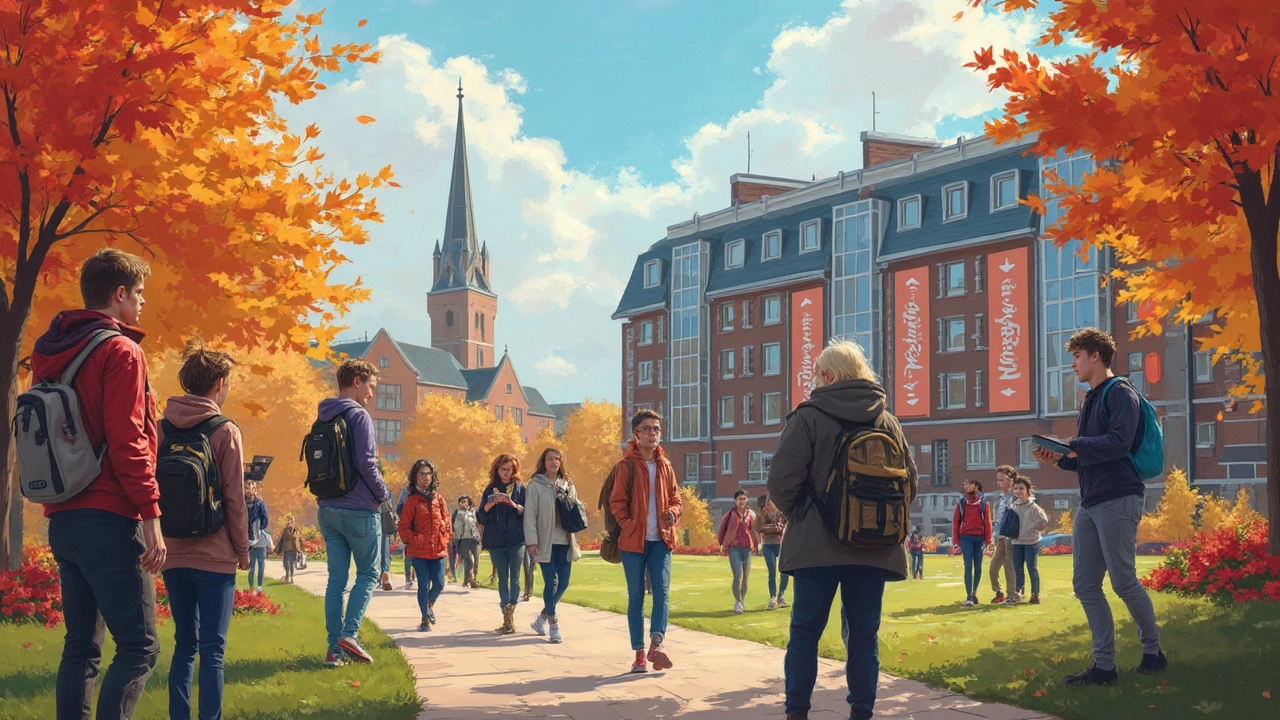How Long Can You Stay in Student Accommodation? Everything You Need to Know
 Feb, 13 2025
Feb, 13 2025
Ever found yourself wondering just how long you can actually stay in student accommodation? Well, you're not alone. It’s a pretty important question, especially with so many other things on your mind like classes, social events, and maybe even that quick coffee run between lectures. Typically, student accommodations offer leases that align with the academic year, which might mean a contract from September to May or June. But what if you need a bit more than that?
Let's break it down. Most universities offer renewal options for students—this means if you’re not ready to ditch that cozy room just yet, you might have the option to extend your stay into the summer months or even a bit longer. But, as always, the early bird gets the worm. Renewal slots can fill up fast, so you'll want to keep an eye on those deadlines.
Now, here's a fun fact. Some institutions have a cap on how many years you can stay in student housing—usually about four to five years. That’s right, they plan for undergraduates to cozy up in those dorms just long enough to snag a diploma. If you're a graduate student or perhaps enrolled in a lengthy program, you might have some special considerations too.
- Standard Lease Durations
- Renewal and Extension Options
- Graduation and Housing
- Exceptions and Special Cases
- Tips for Long-Term Accommodation
Standard Lease Durations
When it comes to student accommodation, the lease you sign is usually tied to the academic calendar. Typically, these leases last around nine months, covering you from the start of the fall semester through the end of the spring semester. This arrangement lets students go back home for the summer or pursue internships without the hassle of subleasing.
But not all leases are created equal. Some schools offer a 12-month option, especially if they want to entice students to keep their spot all year round. This could be a great deal if you're planning to take summer classes or just can't imagine moving out for a few months. Paying extra for the summer months might be worth the comfort of not having to relocate temporarily.
Short-Term and Flexible Lease Options
Short-term leases are another interesting option, although they're not as common. These leases work well if you’re studying abroad for a semester or joining a co-op program. Some colleges offer flexible start and end dates to cater to these unique schedules, but these deals can be rare and often require early planning.
In some cases, student housing also gets tied up with specific course requirements. For example, students in medical or engineering fields might have slightly altered academic schedules due to clinical or practical commitments. Housing offices often work with university departments to match lease durations with these needs, ensuring you're covered when your courses demand it.
If you're curious about how your deposit or rent might compare, here's a little snapshot:
| Lease Type | Duration | Average Monthly Rate (USD) |
|---|---|---|
| Academic Year Lease | 9 months | $800-$1,200 |
| Full Year Lease | 12 months | $750-$1,100 |
| Short-Term Lease | 1-3 months | $900-$1,500 |
Keep these variations in mind when you're planning your stay. It's always a good idea to get in touch with the housing office at your school for the most specific details tailored to your situation. Knowing your options can help balance your living expenses with your academic and social life, ensuring you make the most out of your student housing experience.
Renewal and Extension Options
So, what if you’re not quite ready to pack your bags when the standard leasing period ends? Well, good news! Many universities offer renewal and extension options for students who wish to extend their stay. But here's where it gets a bit tricky and nuanced, so let’s take a closer look.
Understanding Renewal Policies
Most colleges have a straightforward renewal process for student accommodation. If you're planning to return the next academic year, you’ll likely have a designated window where you can renew your contract before it’s offered to incoming students. PRO TIP: Don’t procrastinate! These deadlines can be pretty strict. Some schools operate on a ‘first-come, first-served’ basis.
Extending Your Stay into Summer
Many students wonder about their housing opportunities during summer breaks. Typically, universities provide options to extend your current stay if you plan to attend summer sessions or if you remain in the area for internships or research. It's often as simple as signing an addendum to your existing lease, but keep in mind these spots can fill up quickly too.
Multiple Year Stays: What's the Limit?
Although some institutions have limits on how long undergraduates can live in student accommodation—often around four to five years—there are exceptions. For graduate students or those in longer programs, additional year options might be available. However, it's crucial to verify these details with your housing office to avoid any surprises.
Data from a 2023 student housing survey showed that 60% of colleges in the USA allow students to renew their student housing for at least two consecutive years, provided they meet certain eligibility criteria. Here's a simple breakdown:
| College | Renewal Policy | Maximum Stay During Undergrad |
|---|---|---|
| University A | First-Come, First-Served | 4 years |
| University B | Guaranteed for Sophomores | 5 years |
| University C | Application Process | 3 years |
So, whether you're eyeing a summer stay or maximizing your years right up until graduation, being ahead of the curve is key. Keep your eyes peeled for updates from your college’s housing office, and consider reaching out directly if your plans require special arrangements. After all, the earlier you plan, the smoother your housing experience will be.

Graduation and Housing
So, graduation is around the corner, and you're probably buzzing with excitement wrapped in a little bit of anxiety. What happens to your student accommodation once you flip that tassel and toss your cap in the air?
Most universities will expect you to vacate your college housing shortly after you graduate. Typically, they give you a few weeks to finish up exams and attend the ceremony. This timeline isn't universal, so you should definitely check with your university's housing office for the specifics.
However, if you're pursuing further studies or starting a new program at the same university, you might get the special chance to extend your stay. Some schools even offer alumni housing, but these spots can be limited, so it's best to inquire early.
It's crucial to plan ahead. Here's a quick checklist to make your transition smooth:
- Confirm your move-out date with the housing office right after you know your graduation dates.
- Start packing your things early, focusing on items you don't use every day.
- Look for alternative housing options nearby if you're staying in the area—family, friends, or even those student-specific apartment complexes.
- Be aware of any final inspections or maintenance requirements before leaving to avoid any unexpected charges.
Remember, each university has its own set of rules. Some might have weird timelines or requirements, but preparation is your best friend. So, while you're hitting the books and prepping for that big day, keep a mental note of your housing plan too!
Exceptions and Special Cases
When it comes to student accommodation, most rules are pretty straightforward until life decides to toss a curveball. So, what happens if things don’t go as planned, and you need some exceptions?
Medical or Disability Needs
Sometimes, students face unexpected medical issues or have disabilities that require special accommodation terms. In these situations, universities usually have provisions in place. For instance, they might offer priority access to ground-floor apartments or units that are wheelchair accessible. Pro tip: it's always a good idea to communicate early with the housing office and provide any necessary documentation.
Study Abroad or Internship Opportunities
You ever dream of spending a semester in Paris or landing an internship in New York? Lucky for you, many colleges have swap-out policies. This means you could pause your on-campus living contract for a semester while you’re away on sanctioned university programs.
"Universities are increasingly recognizing the need for flexible housing solutions to accommodate students' diverse academic and personal needs," says Laura Bennett, a University Housing Director with over 10 years of experience.
Emergency Situations
Life happens, whether it's a family emergency or another unforeseen circumstance. If a student needs to vacate temporarily or indefinitely, universities often have protocols to support these cases. Being upfront with the housing office and documenting the situation can go a long way.
Academic Extensions
Sometimes the journey to that degree takes a tad longer than expected. If you're wrapping up your studies beyond the standard timeframe, some institutions may offer extended accommodation for final-year students needing additional time. However, this can depend heavily on availability.
Remember, every college housing policy is different, so staying informed and proactive can help you navigate these exceptions with much less hassle.

Tips for Long-Term Accommodation
Thinking of settling in for a longer haul in student accommodation? You’re going to need some solid tips to make it work seamlessly. Whether it’s about renewing leases, snagging a more permanent spot, or just knowing what to watch out for, we’ve got you covered.
1. Start Early with Lease Renewals
Renewing your lease as soon as possible is crucial. Many college housing facilities offer renewal notices a few months before the academic year ends. Keep an eye on the dates and set a reminder so you’re ahead of the game.
2. Build a Relationship with the Housing Office
A good rapport with the housing staff can go a long way. If they know you and your needs well, they might inform you about upcoming openings or alternatives that fit your long-term plans.
3. Explore Summer Accommodation Options
If you’re planning to stay during summer, ask about summer housing options. Some universities offer special summer rates or on-campus jobs that come with housing perks. It’s worth asking!
4. Consider Alternative Housing
If you can't extend your stay in traditional student residences, look into themed housing or community living arrangements. They can offer some flexibility, plus a chance to meet like-minded folks.
5. Budget for Increased Costs
Long-term accommodation can sometimes mean unexpected costs. Consider additional utility fees or changes in meal plans. Planning your budget will help avoid any unpleasant surprises.
| Type of Housing | Average Rent per Month |
|---|---|
| On-campus Dorms | $600 |
| Themed Housing | $650 |
| Private Apartments | $800 |
By staying informed and proactive, managing long-term student housing becomes a whole lot easier. All it takes is a little bit of planning and you can enjoy your academic home sweet home for as long as you need!